
(CPIML Politburo member Comrade Kavita Krishnan toured Bihar from 13 February to 17 February 2020 in preparation for the Vidhan Sabha march on 25 February to demand a resolution to be passed in the Assembly against implementation of NPR in Bihar and against CAA and NRC. Like other CPIML leaders all over Bihar, she addressed small and big meetings explaining the dangers of the CAA NPR NRC in simple, persuasive, and effective language. A report on the highlights of the visit.)
13 February
ON 13 February she addressed the Jan Ekta Sammelan organized by CPIML at Hajipur, after which she left for Pakdi Barwan in Nawada District of South Bihar where she arrived at 5 pm. At Pakdi Barwan an indefinite dharna on the lines of Shaheen Bagh has been going on since the last 30 days. She was welcomed by AIARLA National Council member Ajit Ji and CPIML supporters. Addressing the meeting at Pakdi Barwan, she explained to the rural people in simple words the dangers of NPR. At 7 pm she left for Nawada, reaching the dharna venue in Bundela Bagh an hour late due to traffic jam in the city. The dharna here has been ongoing for 60 days. Many people including a large number of girls thronged to the big Maidan to hear Comrade Kavita speak. Congress leader Nadeem Hayat was present at the venue. Kallu Miyan, one of the organizers, welcomed Kavita and introduced her to the gathering present. The entire Maidan is decorated with pictures of Gandhi, Ambedkar and freedom fighters. There are also posters of the Preamble to the Constitution in English, Hindi, and Urdu. In one corner, meals are prepared for those who stay the night.
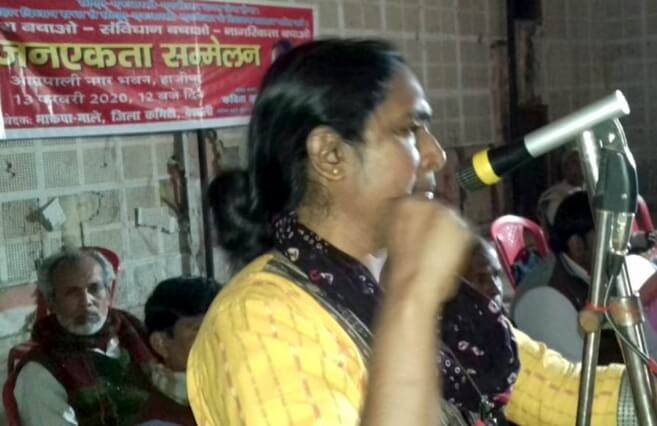
Explaining NPR and NRC, Kavita asked why NPR should be implemented in Bihar if, as Nitish Kumar claims, NRC will not be implemented. Why prepare dough with so much atta if they do not intend to make rotis out of this dough? Focusing on CAA, NPR and NRC, she exposed the lies and half-truths told by the BJP/RSS. After she finished speaking, people lined the entire Maidan to escort her to the main road.
On the way to the night halt in Patna Comrade Kavita stopped at the Biharsharif dharna at the request of Insaf Manch Nalanda convener Sarfaraz Khan. She explained the links between NPR, NRC and CAA and appealed to the people to join the march to the Vidhan Sabha on 25 February to demand a resolution against NPR-NRC-CAA. After her talk, she answered questions related to this historic movement as well as the imminent Assembly election and said that we want a strong Mahagathbandhan with the participation of the Left against BJP, but first the need of the hour is to tell all Opposition leaders who come to you to go among their mass bases and explain the dangers of this draconian law and to ask all Opposition leaders to become part of this movement.
14 February
Comrade Kavita left Patna for Begusarai at 8 in the morning, where she would address a Jan Ekta Sammelan. She arrived an hour late due to traffic jam near Begusarai Township. Upon arrival she was welcomed by CPIML District Secretary Comrade Diwakar, Kisan Mahasabha leader Comrade Baiju, AISA leader Comrade Watan and many others. Comrades who had come for the meeting discussed with her their reports of the preparations for the Vidhan Sabha march. Comrade Kavita gave the suggestion that the remaining time can be utilized for reaching out to the rural poor, explaining to them the dangers of this draconian law, and mobilizing them for the Vidhan Sabha march.
After the meeting at Begusarai she addressed the ‘Shaheen Bagh’ dharna at Nawab Chowk and stressed the need to put pressure on the Nitish government to pass a resolution in the Assembly against NPR-NRC.
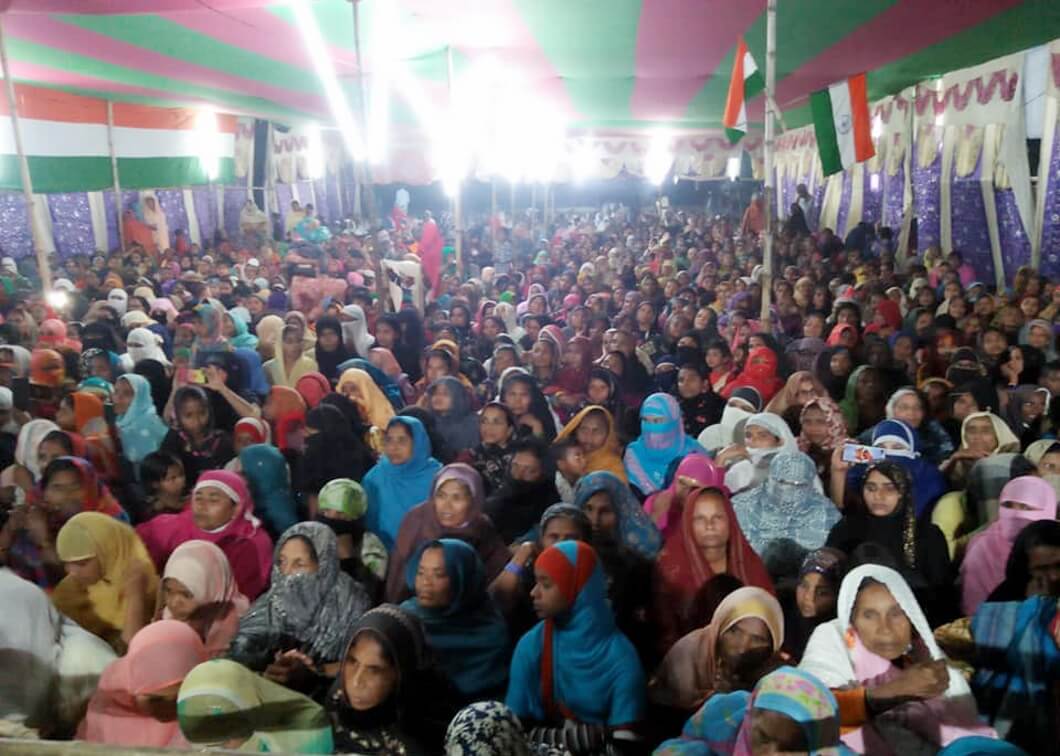
The next stop was Jalkauda village in Khagariya District. The dharna venue here is decorated with pictures of Rani Laxmi Bai, her son strapped to her back, in battle against the British. There are also pictures of Savitri Bai Phule, Ambedkar, Gandhi, Ashfaqulla Khan, Abul Kalam Azad, Hussain Ahmed Madani, and other freedom fighters. Catching the eye immediately is a big picture of the Preamble of the Constitution. Kavita told the people in the villages about the mobilization for the march to the Assembly on 25 February and the various Jan Ekta Sammelans. She drew the attention of the people to the gigantic poster of Rani Laxmi Bai and pointed out that the Supreme Court has asked the women of Shaheen Bagh why they bring their children to the protest. Would the Honorable Supreme Court put the same question to Rani Laxmi Bai? Comrade Kavita said that the women of Shaheen Bagh are blocking the road and thus preventing the country from falling into a deep and dangerous pit. Explaining the intricacies of NPR-NRC-CAA, she pointed out that 70% of people left out of the Assam NRC are women. Being kept out of NRC will mean snatching away of voting rights as well as the right to own land, house, or any other property. Therefore it is very necessary that the rural poor should be made aware of the dangers of this draconian law; therefore, this fight is every citizen’s fight. She appealed to midday meal workers, ASHA workers, sanitation workers and all other people fighting for their rights to join this fight against NPR-NRC-CAA.

The next stop was Marar village where hundreds of women and men were waiting for her. In front of the shamiana is a small corner where there is a swing and other means of entertainment for children. In another corner there is a small model of a detention center. Explaining NPR-NRC-CAA, Kavita told the people how one Madhumita Mandal was forced to spend years in a detention center because of a case of mistaken identity. She spoke about the Constitution, democracy, and human rights to explain the dangers of NPR. She pointed out the tremendous waste of lakhs of crores of rupees on NRC, a huge and unnecessary expenditure, and appealed to the people to participate in large numbers in the Vidhan Sabha march on 25 February.
15 February
Comrade Kavita addressed a Press Conference at Khagaria Circuit House in the morning. During the PC, one journalist asked why all Muslims should not go to Pakistan. His next question was equally astounding; he asked if the CPIML Vidhan Sabha march would not polarize society. She replied by asking how he, as a journalist, could even ask such a question. She then explained CAA to the journalist who listened with bowed head. The PC could have continued longer, but there was a Jan Ekta Sammelan at Navgachhia at 12 noon.

On the way to Navgachhia the vehicle crossed the Kosi River and passed through banana orchards. Comrades travelling with Kavita in the car told her about the problems and the uncertainty of crops faced by banana cultivators. The banana farmers talk about the insufficiency of government aid, but they are as yet unaware of the fact that if they are stripped of citizenship they will not have the right to any government aid or benefits. At the Jan Ekta Sammelan in Navgachhia Kavita asked activists how many have read up about NPR-NRC-CAA. Only three hands went up. She then explained the link between NPR-NRC-CAA and citizens’ rights and livelihood issues; she urged the activists to go among the rural people and explain CAA from the perspective of their own issues and rights.
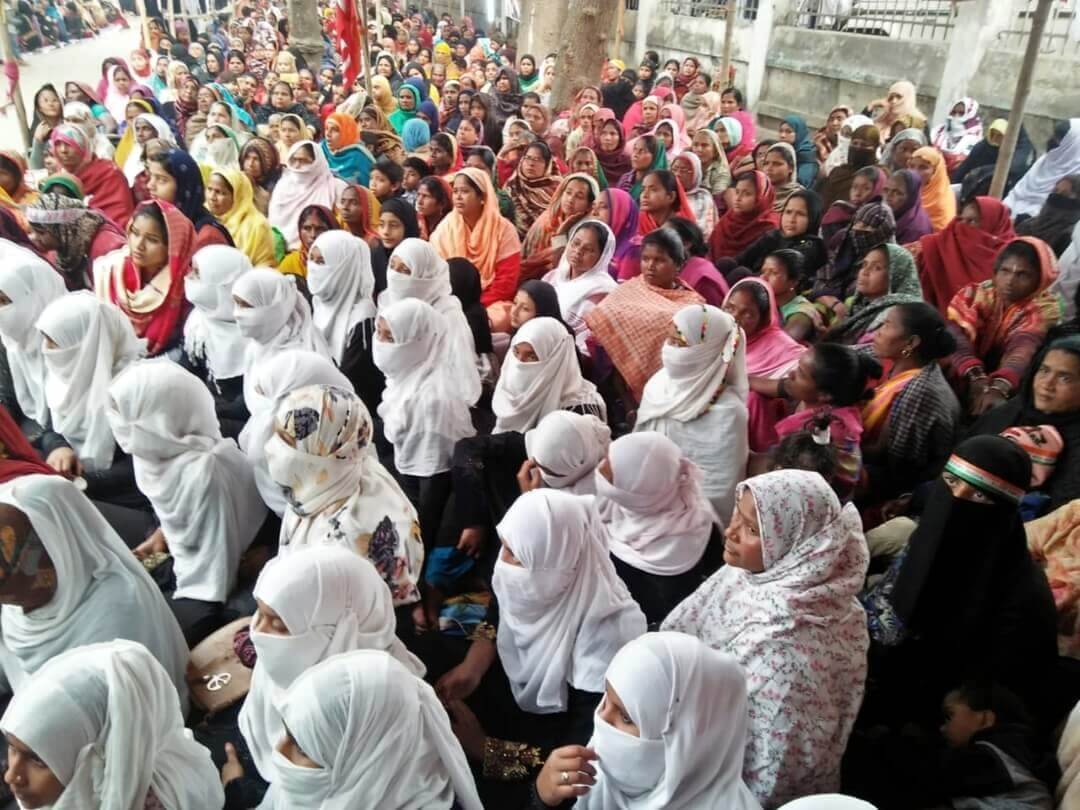
After Navgachhia the next stop was Purnea. Already established at the dharna venue is a statue of Renu Ji. Among the people who came to hear Kavita speak were a large number of school girls. One corner was occupied by Santhal people who were listening with great interest. At the end of the speech, many people wanted to meet Comrade Kavita and girls were eager to click selfies with her.
From Purnea they went to the ‘Shaheen Bagh’ in Araria. Comrade Kavita met many women here, who told her that they do not have voter cards or ration cards. The dharna venue gradually filled up with hundreds of women and men as well as some citizens’ rights activists. Explaining that NPR and NRC are actually one and the same thing, Kavita told the people that after NRC got a bad name the government is playing the NPR trick where a government official like a Tehsildar can put anyone into the ‘Doubtful Citizen’ category. After being declared doubtful if the citizen cannot show the required birth documents their voting rights as well as all other rights to welfare schemes will be stripped, their property will be seized, and there is a provision under which they can be sent to a Detention Center. The worst affected by this draconian law will be the working class. Therefore, it is very necessary that we all join in the Vidhan Sabha march on 25 February to put pressure on the Nitish government to pass a resolution against NPR-NRC-CAA. Comrade Kavita was invited to the Shaheen Baghs of Supoul and other places but there was paucity of time and she had to be at the Jan Ekta Sammelan in Dumraon, Buxar District on 16 February. The Araria meeting concluded with the reading of the Preamble to the Constitution.
16 February
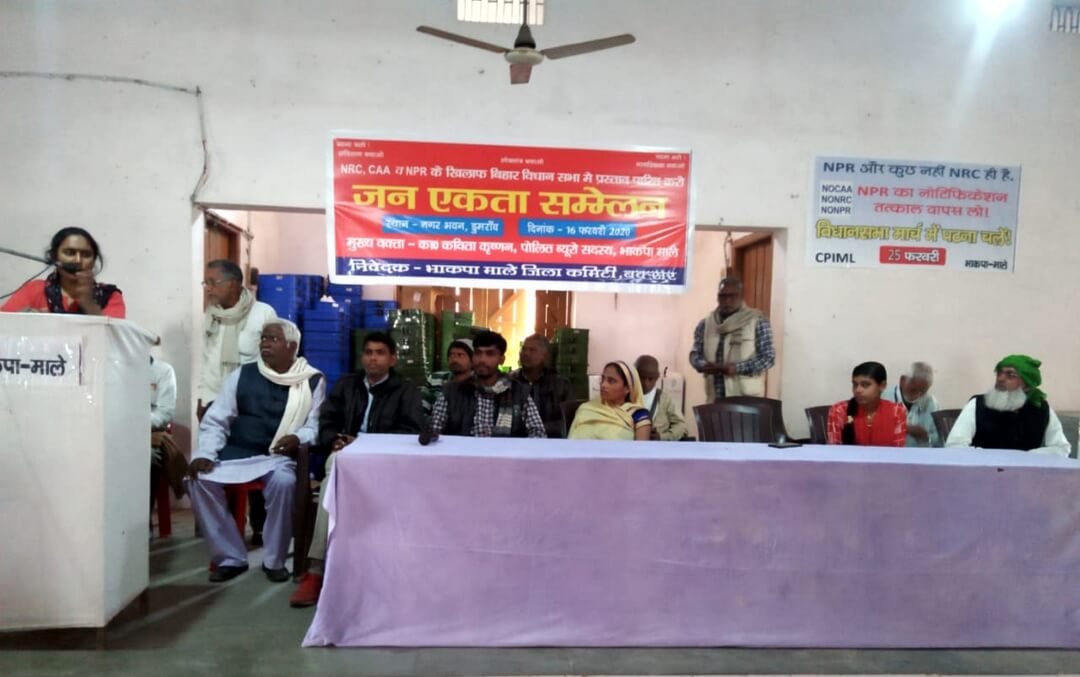
Travelling overnight from Araria and getting stuck in a traffic jam at Ara, Kavita reached Dumraon late, at 1 pm. She explained the importance of the Vidhan Sabha march to the activists at the Sammelan and discussed how to make optimum use of time and mobilize workers, farmers, youth, Rasoiyas and other scheme workers. A delegation of teachers met with her and discussed the dismal state of education in Bihar and asked for support and solidarity for the ‘equal pay for equal work’ strike they are planning.
On the way to the next stop, Sasaram, there was a serious traffic jam at Dawath. The roads are narrow and not fit for heavy traffic. After enquiring about alternate routes to reach Sasaram, they took a kutcha road by the canal and reached the ‘Shaheen Bagh’ of Sasaram with a delay of two hours. Speaking at the venue, Kavita spoke of the Delhi election result and said that people want governments to spend their hard-earned tax money on roads, education, and health instead of wasting lakhs of crores of rupees on NRC and Detention Centers. She said that hate had lost and Shaheen Bagh had won in the Delhi election. Before leaving, she appealed for large participation in the Vidhan Sabha march on 25 February. Due to lack of time she could not reach the Piro dharna but reached the Shaheen Bagh at Gadhani at 10 pm where she was welcomed by RYA National President Manoj Manzil, CPIML Gadhani Block Secretary Naveen, and others. Even so late at night, hundreds of women and men were waiting eagerly to hear Kavita speak. They included people from all religions and classes. The rural poor were there in large numbers. This ‘Shaheen Bagh’ is unique in that it is organized by Insaf Manch and CPIML activists.
17 February
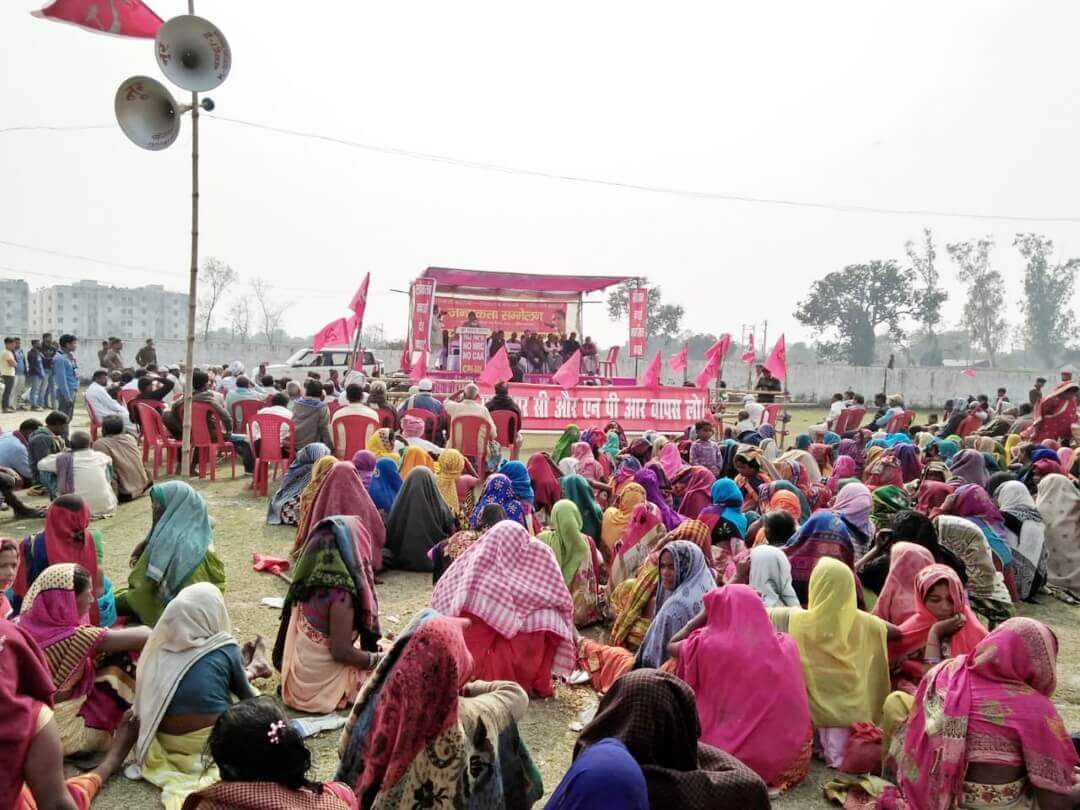
Comrade Kavita reached Bagaha in Western Champaran at noon and stopped at the home of a senior CPIML activist where Central Committee member Virendra Gupta and others were waiting for her. After lunch she set off to address the Jan Ekta Sammelan. Tharu women from nearby villages attended the meeting in large numbers. Here also, people from all classes and religions participated in the meeting. Kavita alerted the people to the dangers of NPR-NRC and said that just as the names of many poor are left out of ration lists, Indira Awas lists, and pension lists, their names could well be left out of NRC due to lack of documents or rampant corruption. This government is bent on snatching away citizenship from the very citizens whose votes put them in power. She said that the Vidhan Sabha march on 25 February is a fight to save India’s Constitution, democracy, and composite culture.
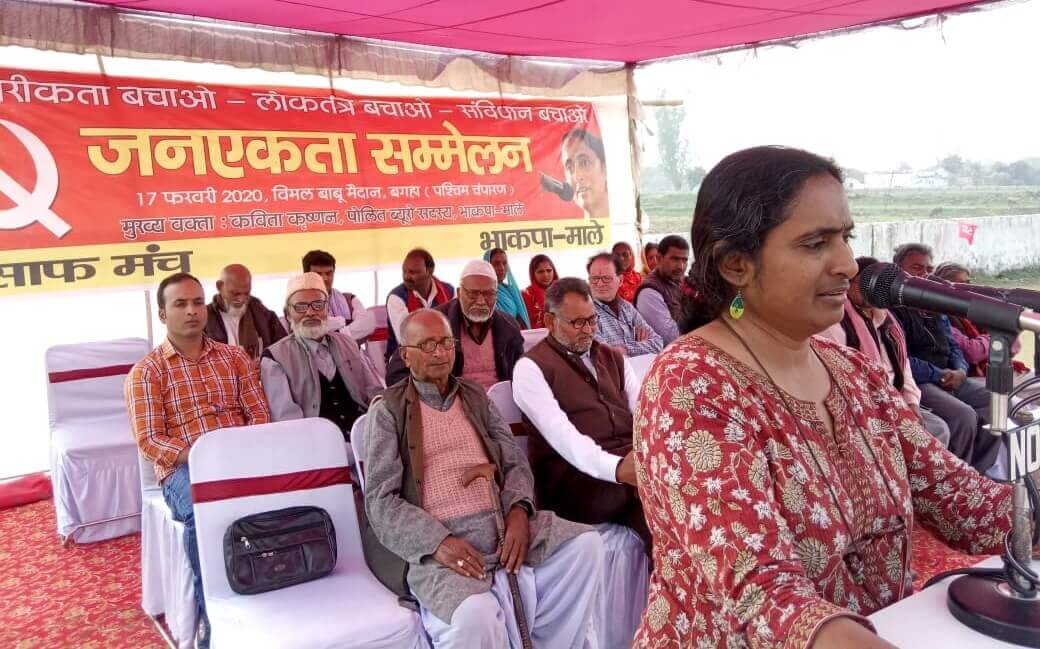
At 4 pm Kavita left for Devraj village, accompanied by Comrade Virendra Gupta. The indefinite dharna in this village is into its 34th day. Thousands of women and men had gathered to hear her speak at this Shaheen Bagh. She explained how a government official will have the power under NPR/NRC to declare anyone a ‘doubtful citizen’ and deprive them of the right to vote. The government can also snatch away citizenship from people who demand their rights. The documents required by NRC include proof of date and place of birth and residence of parents and grandparents. She said that 70% of people kept out of NRC in Assam were women of all communities because women’s names get changed after marriage and they of all people are least likely to possess the required documents. A large number of women in our society do not even know their date of birth. Migrant workers were also unable to show the required documents. Modiji says that CAA is meant for giving citizenship to all persecuted people; but our Constitution already has provision for giving citizenship without discrimination. Make no mistake; CAA is just a tool for declaring non-Muslims left out of NRC “refugees”, and Muslims left out of NRC “infiltrators”. Even then, non-Muslims will be required to show that they entered India from Pakistan, Bangladesh or Afghanistan in order to be declared “refugees”! How can people who were born in India prove that they entered India from one of these 3 countries? Why should Muslims without documents be declared “infiltrators” and non-Muslims “refugees” when both are in fact Indian citizens? This government is dividing us into Hindus and Muslims in order to make slaves of all of us. Now is the time to unite in solidarity against this divisive hatred to save our rights, and to join the Vidhan Sabha march in largest possible numbers to put pressure on the Nitish government to pass a resolution against NPR-NRC-CAA.
The next stop was Betiya and the Shaheen Bagh of Rajdevada. The dais here is in the form of the national tricolor. Working women from the minority community as well as rural poor formed a large part of the audience gathered here. Comrade Kavita narrated how Ranveeer Sena people captured Karbala land in Kanpahari (sahar) and Nawadih (Tarari) and how they attacked the Karbala Mukti Jagaran March on 10 January 1996. Today with the implementation of this draconian law feudal-communal forces feel that now there is no need to form gang-armies like the Ranveer Sena, because NPR-NRC has been brought to do the job of subjugating and enslaving the poor. Here also she appealed to the people to join the Vidhan Sabha march on 25 February. She narrated how she had tweaked Subhadra Kumari Chauhan’s poem to coin the new slogan “Khoob ladi Janaani woh to Shaheen Bagh ki Daadiyan hain, Naaniyan Hain; Jamia-Aligarh-JNU-Betiya ki Ladkiyan Hain”. This slogan, modified here and there, was part of all her meetings to appeal to the people to join the Patna march.
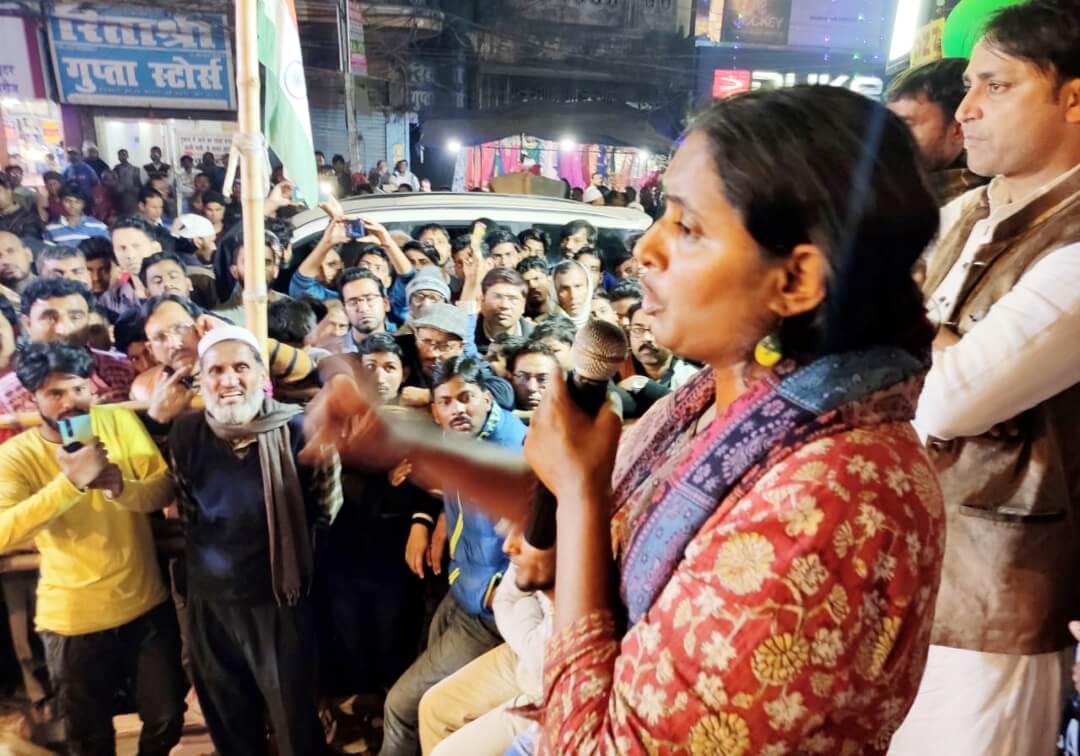
At 8 pm Comrade Kavita reached Motihari. Thousands had gathered at the ‘Shaheen Bagh’ here. She told them about her Party, CPIML, and spoke to them of many things. This was the last meeting of the day. Despite having a very sore throat from so much speaking, she felt invigorated and enthused by talking to the people. She said that some people are asking why the women of Shaheen Bagh have blocked the road. Even the Supreme Court asked how long the road would remain blocked. She pointed out that actually Shaheen Bagh has closed only one road; it is the Delhi police who have blocked several other roads in order to inconvenience the public. The women of Shaheen Bagh have sighted the gaping dangerous pit ahead; and they are bravely blocking the road so that the country should not fall into that pit! The Supreme Court says women should not bring their children to the protest, but why does the Supreme Court remain silent when women workers across the country are forced to bring their children to work every day? Whether women go to work or to a protest, where can they leave their children safely?
Nowadays children are taught—in schools, in society, at home—to hate others on the basis of religion. Hindu children are taught by their elders, especially the PM and HM on TV, to call Muslim children ‘Pakistani’. Young people are pushed into unemployment, fed the opium of communal hate and then encouraged to become terrorists and shoot others. Hindus are in danger because of BJP-RSS; the danger is that their children will walk in the footsteps of Godse and become terrorists. If these children come to ‘Shaheen Baghs’ they can learn Constitutional values and become detoxified from the hatred being fed to them by BJP-RSS. In Delhi a gang of goons returning from a pro-CAA rally entered Gargi College and attacked and molested the women students. The police did not lift a single lathi to stop these goons and have not arrested a single person. The ABVP goons who attacked and injured students and teachers at JNU have not been arrested even after a month has passed. The same Delhi police attacked a peaceful protest at Jamia, blinded and injured students and molested women students. This is the truth of BJP’s ‘Beti Bachao’. Kavita then explained how NPR-NRC-CAA is a package brought to impose dictatorship and enslave the people. She concluded by talking about a favorite author of hers, George Orwell, who was born in Motihari and whose writings have always inspired people to fight against dictatorship. After the meeting, the people enthusiastically took her to view the age-old Urdu Library located nearby. This was the last program for the day.
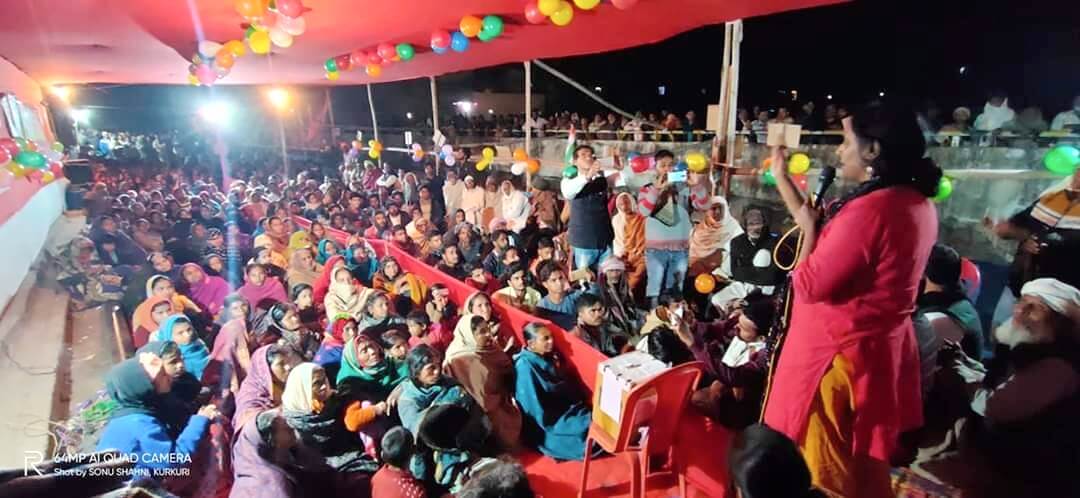
During the entire ‘Yatra’, the Gadhani Shaheen Bagh was unusual and unique because it is organized by Insaf Manch and CPIML activists. Also, the number of non-Muslims at this dharna is prominent. Today these Shaheen Baghs have emerged as new places for movements to take shape, where there is creativity in addition to peaceful protest. They have the Constitution, they have books, and they also have pictures and posters of freedom fighters. Muslim women with their own identity are giving secularism a new definition. Children, the elderly, and youth—all come here in the evenings to share their experience. The songs of freedom sung here are echoed in the lanes of villages. Young people have been quite innovative in creating places of protest like these Shaheen Baghs. Each Shaheen Bagh has its own Facebook page to help volunteers and citizens to organize. Shaheen Baghs also have their Whatsapp groups for communication and organization. All of us should take our children to these Shaheen Baghs so that they can be free from religious prejudice and learn from this democracy-enhancing movement.

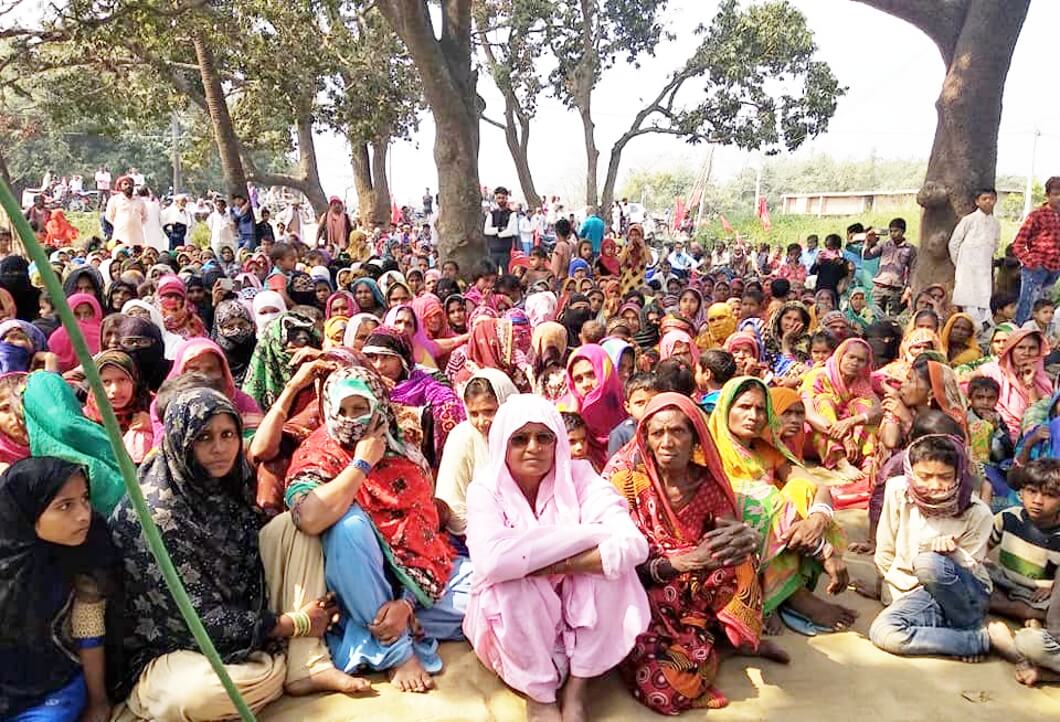
Liberation Archive
- 2001-2010
-
2011-2020
- 2011
- 2012
- 2013
- 2014
- 2015
- 2016
- 2017
- 2018
- 2019
-
2020
- Liberation, JANUARY 2020
- Liberation, FEBRUARY 2020
-
Liberation, MARCH 2020
- Delhi 2020 Verdict – A Much Needed Blow to the Modi-Shah Regime
- Modi and Trump: Two Tyrants Meet in an Extravaganza Wasting Crores! But Does It Benefit India and Indians?
- SC Verdict on Reservation in Promotions
- Population Control Is Anti Women, It Is Not Reproductive Justice
- The Countrywide Upsurge against CAA-NRC-NPR: What We Have Achieved and What Comes Next
- Kanpur's women-led NRC protest has overturned local power structures: ‘They aren't listening to us’
- Campaign Diary: Comrade Kavita Krishnan in Bihar
- Against Fascism – Women Shall Fight And Win! 8th National Conference of AIPWA Held at Udaipur
- Rise In Rage Against Sexual Assault By A Mob Against Students At Gargi College And By Delhi Police Against Jamia Millia Islamia Students
- CPIML condemns slapping of NSA on Dr Kafeel
- Release Chauri Chaura Padyatris without Delay
- Sanitation Workers’ Struggle in Bihar Against Outsourcing
- Preparations on for Vidhan Sabha March on 25 February
- Left Parties Report on Police Brutality in Bilriyaganj (Azamgarh)
- False Cases slapped on Party Leaders in Pilibhit
- Fearless Freedom
- Liberation, APRIL 2020
- Liberation, MAY-JUNE 2020
- Liberation, JULY 2020
- Liberation, AUGUST 2020
- Liberation, SEPTEMBER 2020
- Liberation, OCTOBER 2020
- Liberation, NOVEMBER 2020
- Liberation, DECEMBER 2020
- 2021-2030
Charu Bhawan, U-90, Shakarpur, Delhi 110092
Phone: +91-11-42785864 | Fax:+91-11-42785864 | +91 9717274961
E-mail: info@cpiml.org







